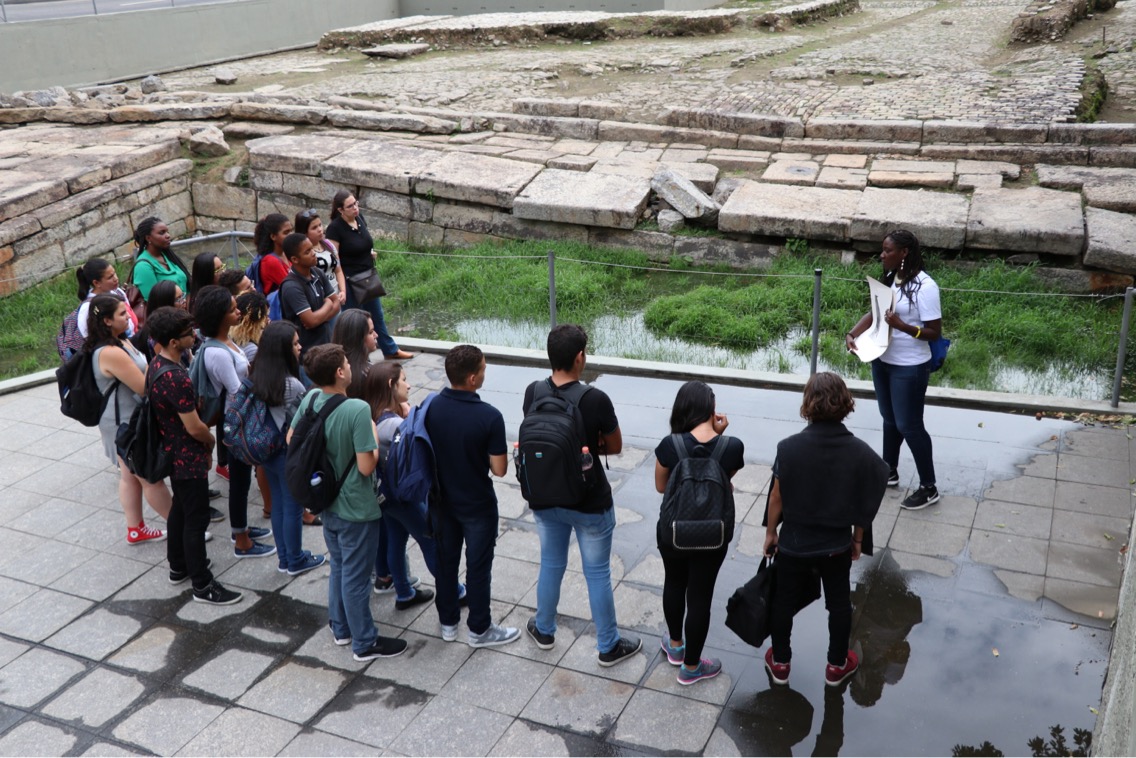
Rooted in our culture and society, despite more than half of the population being represented by Black men and women, racism is still very much present, veiled, and often ignored by policies or the media.
But you just have to put yourself in someone else’s shoes and take an empathetic look around you and you will notice it. That is why we want – and need (!) – to talk about anti-racist tourism as well. Above all, it is necessary to promote initiatives in this direction and give a voice to people who work for an egalitarian life that is free from all sorts of prejudice.
In today’s blog post, we chat with the CEO of Conectando Territórios (“Connecting Territories”), a tourism agency that connects people to Afro-Brazilian culture, memory, and history. Thaís Rosa Pinheiro is a Black woman, entrepreneur, and tourism expert, who holds a Master’s Degree in Social Memory from UniRio. She is also a specialist in African and Afro-Brazilian history, as well as in Peace Studies and Conflict Resolution.
The conversation was great! Check it out below and get to know this important initiative in favor of anti-racist tourism – and Afro-Brazilian history.
Raízes Sustainable Development: Thaís, how did your relationship with tourism begin?
Thaís Rosa Pinheiro: I have always been passionate about cultures other than mine, especially the diversity of Brazilian culture. I am a tourism expert and I own a travel agency that seeks to break stereotypes while bringing people from different territories together.
Raízes: What can we do as a society to adopt anti-racist conduct?
Thaís: Education. Knowing Brazilian history is the first step to understanding where we are in the present. Then, analyze your privileges, and from there onwards, think about real actions that can contribute to the reduction of racial inequalities in Brazil.
Raízes: And in relation to tourism, how can one take advantage of travel to put all these anti-racist discussions into real practice?
Thaís: Regarding Brazilian tourism in particular, getting to know traditional communities, Afro-Brazilian and indigenous backgrounds helps to connect with their history and culture. It also collaborates toward generating income for Black and indigenous communities and entrepreneurs, for example.
Raízes: Your company, Conectando Territórios, created the web series “Nzinga: Women Travelers”. Tell us a little bit about that.
Thaís: The web series “Nzinga: Mulheres Viajantes” brings the story of Black women who travel the world, undertake their dreams and projects, and expand them to other territories. It aims to break stereotypes of Black women, showing plurality, seeking to encourage other women, and bring references to the world of tourism.
Nzinga was an African, Angolan queen who fought in the 17th century against Portuguese colonialism, seeking the autonomy of her people.
Raízes: Why did you decide to create such a series?
Thaís: Because I want to bring stories from other Black women and show the multiplicity of us all. And also, I have always traveled and been in situations in which I happened to be the only Black woman in hotels around the world. They didn’t recognize me as a Brazilian citizen because they only had references to white (or passing) Brazilians.
In addition to realizing the invisibility of Black people in the world of tourism, which, thankfully, is gradually changing, back in 2010 I started meeting other women like me around the world and began to interview them to learn about their stories.
The idea was to bring stories of places that have stereotypes around them, like Nigeria for example. So, what I want is to demystify beliefs and bring other perspectives and voices to the tourism field.
Raízes: How does curatorship work for choosing interviewees?
Thaís: I started with my friends who are role models for me, and who have incredible life stories. But the main idea is to focus on women with the same characteristics: those who take charge of their lives and dare to chase their dreams around the world.
The web series “Nzinga: Mulheres Viajantes” (Nzinga: Traveling Women) was launched in 2020 and has 3 episodes. While searching for new interviewees and sponsors or supporters for the project, Thaís is offering, in this pandemic era, the Virtual Tour of Little Africa, an ethnic tourism project that seeks to understand the context of the history that has led us until today.
During the conversation, Thaís indicated other content, portals, and references from authors related to the topic. Here are her tips for you to know:
YouTube Connecting Territories: it is the official channel of Thaís’s agency, of Community Based Tourism, which seeks to connect people to Afro-Brazilian memory, culture, history, and traditional communities such as quilombolas and urban communities.
Portal Geledés – Instituto da Mulher Negra: a civil society organization that stands in defense of women and Black people, because it understands that these two social segments suffer from disadvantages and discrimination in access to social opportunities due to racism and sexism currently endemic in Brazilian society.
Portal Alma Preta: journalism agency specializing in racial issues in Brazil. The content is diverse, with reports, coverage, columns, reviews, audiovisual productions, illustrations, and dissemination of events from the Afro-Brazilian community.
Some references by authors and books in different areas: Beatriz Nascimento, Helena Teodoro, Abdias Nascimento, Silvio Almeida, Milton Santos, and Lélia Gonzalvez.
Studying, knowing, and delving into history are important so that mistakes do not keep happening. It is necessary to reflect to change attitudes. It is with this in mind that Raízes agreed to participate in some virtual meetings of anti-racist training, developed by Sistema B, in partnership with the Institute of Identities of Brazil. Are you with us in this fight?

